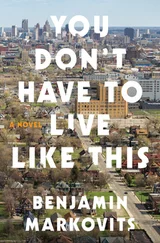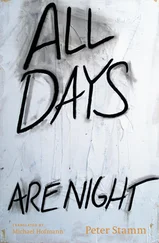Andreas imagined how he would tell Delphine about his illness, or Nadia and Sylvie and Jean-Marc. Isn’t it hot today. How was your vacation? Oh, by the way, I’ve got cancer. Everyone would get to hear about it, his colleagues, the school administration, the pupils. Maybe they would have to operate on him and give him radiation treatment. He would have a course of chemotherapy. He pictured himself in the school with no hair or a silly cap. Everyone staring at him, knowing the situation, pitying him. They would presume to discuss him and his “case,” his tragic case. They whispered behind his back. When they talked to him face to face, they would pretend nothing was different. But he would be a patient in everything he said and did.
He lit a cigarette, but it didn’t taste good, and he dropped it disgustedly in the river.
They would start to avoid him. He remembered a colleague from a few years back, a French teacher, who had a brain tumor. He had gone out of the man’s way himself. He hadn’t even turned up for the little drinks party the colleague had given for his leaving. He left some pathetic excuse. When they had a collection a few months later, for flowers, he put in far too much. Now he would be the one to whose health they would drink, whose grave flowers they would collect.
There had to be another way. There was always another way. Perhaps the patch really was just the scarring from some old tuberculosis, or it was a benign tumor. Even if the results were bad, nothing was certain. The lab could have made a mistake. The samples could have gotten mixed up with someone else’s. It was a tiny chance, but there it was. Andreas didn’t want to know. They couldn’t force him to know. As long as he didn’t know anything, nothing could happen to him. He had to get away from here. He had to begin a new life. That, he thought, is my only chance.
His decision spurred him on. It was as though he had got back control over his own life, as though, maybe for the first time since going to Paris, he had his life in his hands again. He would heal himself of his past life, which hadn’t been one. From now on, he would determine things himself. He would make his own decisions, and leave them all, one after another, and, last of all, himself. He called Nadia, but she wasn’t home. Sylvie was in a rush, as always. He asked if she had any time tomorrow. “But tomorrow is Saturday,” she said, “you know, family day.”
“Just very quickly,” said Andreas. “I’ve got something I want to say to you.”
Sylvie laughed. They agreed to meet tomorrow afternoon, somewhere near her apartment. Half an hour, she said, not a second more.
In the apartment, Delphine was waiting for him. She had been worried. She asked what had kept him so long. Andreas was irritated by her question and the way Delphine had taken over and claimed he owed her an explanation. He looked at her in silence.
“What’s the matter?”
“I got my results,” he said. He reflected for a moment, and then he smiled. “Everything’s fine — couldn’t be better.”
“Really?” asked Delphine, as though she couldn’t believe it. Then she flung herself at him. She kissed him on the mouth a couple of times, and said now they had to celebrate. He felt suspicious of her joy, looked for signs of disappointment in her eyes. Most people — and here he didn’t exclude himself — preferred the misfortune of others to ordinary dull day-to-day life. But Delphine seemed to be genuinely happy. She wouldn’t stop hugging him, and rubbing his chest with the flat of her hand, as though giving him some kind of first-aid.
Andreas took her to the Vieux Moulin, a restaurant that was only a short distance from his house, though he didn’t often go there. The food was expensive, and the staff were moody, because the place was usually half-empty. They ate oysters and some main course the waiter recommended, and they shared a bottle of wine.
“I thought you were a vegetarian,” Delphine said.
Andreas replied that he wasn’t a vegetarian, he just didn’t eat meat all that often. But now he felt like it.
“I’m a new man,” he said, and rolled his shoulders. “I’m going to start all over again.”
“And do everything differently,” laughed Delphine.
“And do everything differently,” said Andreas.
“Right. And now we’re going dancing,” said Delphine.
Andreas protested, but it was no use.
It was very loud in the discotheque. They bought drinks at the bar, and watched the dancers for a while. Then Delphine took Andreas by the hand and led him out onto the dance floor. She went on ahead, dodging through the mass of people. She walked on light feet, like a cat, or a model, he thought. Andreas stared at her bottom, then she spun around, pushed his hand aside, and drew him against her. She beamed, kissed him on the mouth, laid her other hand on his shoulder. She seemed to be unaware of the rhythm of the music, until Andreas took over. When that happened, Delphine laughed, a silent laugh that the music drowned out. Her head went right back, and Andreas thought either she’s drunk or she’s happy, it doesn’t matter, comes to the same thing. He too was drunk with the wine and the loud music and the flashing lights. And perhaps he was happy as well, or just excited, he couldn’t tell. He wasn’t sick, for a moment he almost believed it himself. He turned his head this way and that while he danced, he looked at other women, but it was only Delphine he wanted to dance with, who held his face in her hands to make him look at her, and then let him go again. A strobe light cut the movements of the dancers into individual stills, and then the colored lights came back on, and everything gleamed in red, and blue, and red again. Delphine spun around Andreas’s hand, lost the beat, and hugged him clumsily, while the other couples jigged up and down around them.
The music seemed to have gotten quieter, Andreas had the sensation of floating, he was moving in slow motion. He held Delphine, and she gripped him, then he picked up the beat and took Delphine with him. The music was back again, and louder than before. The DJ sang something, and the dancers sang along, no one seemed to have understood the words, they were all just mimicking the sounds, as though they were in a foreign language that was all vowels, meaningless words, a pounding rhythm, a song that imperceptibly segued into another, and then another.
Delphine leaned up to Andreas and shouted in his ear that she wanted to sleep with him, right now.
“Here?” Andreas yelled back. Delphine didn’t understand him, so he yelled “Here?” again.
She punched him playfully on the shoulder, and dragged him off the dance floor.
Andreas didn’t turn the lights on in the apartment. He opened all the windows. There was a light in the yard, and its orange glow suffused everything in the apartment. Delphine had followed Andreas into the bedroom, and he started undressing her. When she was naked, he took off the ring she wore on one finger, and her little earrings as well. She laughed and asked him what he was doing. He didn’t answer. While they made love, he told her to look at him. At first she wouldn’t and turned her head away, but then she did, and it seemed to excite her as it excited him. Her pupils were dilated in the dim light, and her eyes looked as though they were made of glass.
Andreas and Delphine lay side by side, sweating. She had her palm on his thigh, and was stroking it mechanically. She asked him what he was thinking.
“I want you to leave,” he said.
“Leave where?”
“Go home.”
“Now?”
“Yes,” said Andreas. “Don’t be upset, just I’d prefer to be on my own.”
He had thought Delphine would resist. But instead she got up without a word, went in the bathroom and showered. She came back, and got together her clothes and her jewelry in the dark. Andreas felt like making love to her again, and for an instant he regretted having sent her away. He got up and embraced her from behind. She shook him away.
Читать дальше












